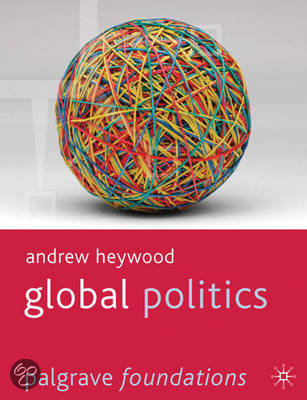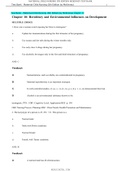Heywood Chapter 1 – Introducing Global Politics
1. What is global politics?
international paradigm: nations are the building blocks of world politics
globalization paradigm: interconnectedness, interdependence, ‘units’ of states -> ‘one world’
global politics tries to embrace both
o continuity and enduring characteristics & accelerating changes
‘global’:
o worldwide: issues of planetary significance, more important global dimension of politics
o comprehensive: all elements in the system, the global level has not transcended other levels
what happens within and between states impact each other -> moves beyond IR
‘global’ and ‘international’ politics coexist, they complement one another, not rival understandings
the ‘great debates’ of IR:
o ‘30s-50s: liberal internationalists (chance for peaceful cooperation) vs realists (power politics)
o ‘60s: behaviouralists vs traditionalists over if it is possible to develop objective laws of IR
o ‘70s-80s: realists vs liberals & vs Marxists (who interpreted IR in economic terms)
o late ‘80s: positivists vs post-pos. (crit. perspective) over the relationship of theory and reality
from international to global politics
o new actors on world stage
international politics is ‘inter-state’ politics, state-centric, state-system
Westphalian principles:
o States enjoy sovereign jurisdiction, in the sense that they have
independent control over what happens within their territory (all other
institutions and groups, spiritual and temporal, are therefore subordinate
to the state).
o Relations between and among states are structured by the acceptance of
the sovereign independence of all states (thus implying that states are
legally equal).
mixed-actor model (TNCs, NGOs, etc.)
o increased interdependence and interconnectedness
billiard ball model (influence through external pressure)
associated with realist theory, interaction is linked to military or security issues
clear distinction between domestic (state borders!) and international politics
conflict and cooperation are determined by the power distribution
balls are not the same size, there are ‘great powers’, there is intervention
o military prowess, capacity for their own security and influence
o economic power (this is a necessary but not sufficient condition)
o global, not just regional spheres of interests
o ‘forward’ foreign policy, actual impact on international affairs
however, transnational trend, borders becoming ‘porous’, interdependence,
interconnectedness, need for collective efforts
cobweb model
complex interdependence: states are drawn into cooperation and integration
o economic and other issues have become more prominent
o military force has become a less reliable policy option
levels of interdependence vary greatly
interdependence is not always about peace but asymmetry and domination
, o trend towards global governance
context of anarchy, self-help, balance of power
growing number and significance of international organizations (UN, IMF, WTO, etc.)
collective dilemmas (solutions need international cooperation)
2. Globalization and its implications
Globalization is a complex, elusive and controversial term.
process, policy, marketing strategy, predicament, ideology (‘globalism’)
‘the widening, intensifying, speeding up, and growing impact of world-wide interconnectedness’.
three main interpretations:
o Economic globalization is the process through which national economies have, to a greater or
lesser extent, been absorbed into a single global economy
o Cultural globalization is the process whereby information, commodities and images that
have been produced in one part of the world enter into a global flow that tends to ‘flatten out’
cultural differences between nations, regions and individuals
o Political globalization is the process through which policymaking responsibilities have been
passed from national governments to international organizations
three main positions on the issue:
o hyperglobalists:
technological determinism, ‘borderless world’, submit to the global markets
however, they underestimate values, perceptions and ideological orientations
the role of states is not becoming irrelevant but changing
homeland security issues (migration, terrorism) are still there -> importance of borders
o sceptics:
dismiss the idea of an integrated global economy and see it as an ideological tool
‘business as normal’ <-> goods, capital, information and people do move around more
freely with inevitable consequences for economic, cultural and political life
o transformationalists: ‘Much has changed, but not everything’
accepts that profound changes have taken place in the patterns and processes of world
politics without its established or traditional features having been swept away
major transformations:
The breadth of interconnectedness has stretched social, political, economic and
cultural activities globally – single worldwide system?
The intensity of interconnectedness has increased with the growing magnitude
(e.g. migration, trade, movies, etc.)
Interconnectedness of financial markets, immediate reactions
approaches to globalization:
o realist:
sceptical stance, seeing it more in terms of intensifying economic interdependence
rather than interlocking global economy
the state continues to be a dominant unit in world politics
they emphasize that globalization is a manifestation of the international system, made
by and for (dominant) states
interests of Western states in general and the USA in particular
instead of peace and cooperation it is likely to bring mutual vulnerability -> conflict
o liberal:
positive attitude, victory of the market, economic globalization is a positive-sum game
freer flow of information and ideas creates opportunities and more dynamic societies
1. What is global politics?
international paradigm: nations are the building blocks of world politics
globalization paradigm: interconnectedness, interdependence, ‘units’ of states -> ‘one world’
global politics tries to embrace both
o continuity and enduring characteristics & accelerating changes
‘global’:
o worldwide: issues of planetary significance, more important global dimension of politics
o comprehensive: all elements in the system, the global level has not transcended other levels
what happens within and between states impact each other -> moves beyond IR
‘global’ and ‘international’ politics coexist, they complement one another, not rival understandings
the ‘great debates’ of IR:
o ‘30s-50s: liberal internationalists (chance for peaceful cooperation) vs realists (power politics)
o ‘60s: behaviouralists vs traditionalists over if it is possible to develop objective laws of IR
o ‘70s-80s: realists vs liberals & vs Marxists (who interpreted IR in economic terms)
o late ‘80s: positivists vs post-pos. (crit. perspective) over the relationship of theory and reality
from international to global politics
o new actors on world stage
international politics is ‘inter-state’ politics, state-centric, state-system
Westphalian principles:
o States enjoy sovereign jurisdiction, in the sense that they have
independent control over what happens within their territory (all other
institutions and groups, spiritual and temporal, are therefore subordinate
to the state).
o Relations between and among states are structured by the acceptance of
the sovereign independence of all states (thus implying that states are
legally equal).
mixed-actor model (TNCs, NGOs, etc.)
o increased interdependence and interconnectedness
billiard ball model (influence through external pressure)
associated with realist theory, interaction is linked to military or security issues
clear distinction between domestic (state borders!) and international politics
conflict and cooperation are determined by the power distribution
balls are not the same size, there are ‘great powers’, there is intervention
o military prowess, capacity for their own security and influence
o economic power (this is a necessary but not sufficient condition)
o global, not just regional spheres of interests
o ‘forward’ foreign policy, actual impact on international affairs
however, transnational trend, borders becoming ‘porous’, interdependence,
interconnectedness, need for collective efforts
cobweb model
complex interdependence: states are drawn into cooperation and integration
o economic and other issues have become more prominent
o military force has become a less reliable policy option
levels of interdependence vary greatly
interdependence is not always about peace but asymmetry and domination
, o trend towards global governance
context of anarchy, self-help, balance of power
growing number and significance of international organizations (UN, IMF, WTO, etc.)
collective dilemmas (solutions need international cooperation)
2. Globalization and its implications
Globalization is a complex, elusive and controversial term.
process, policy, marketing strategy, predicament, ideology (‘globalism’)
‘the widening, intensifying, speeding up, and growing impact of world-wide interconnectedness’.
three main interpretations:
o Economic globalization is the process through which national economies have, to a greater or
lesser extent, been absorbed into a single global economy
o Cultural globalization is the process whereby information, commodities and images that
have been produced in one part of the world enter into a global flow that tends to ‘flatten out’
cultural differences between nations, regions and individuals
o Political globalization is the process through which policymaking responsibilities have been
passed from national governments to international organizations
three main positions on the issue:
o hyperglobalists:
technological determinism, ‘borderless world’, submit to the global markets
however, they underestimate values, perceptions and ideological orientations
the role of states is not becoming irrelevant but changing
homeland security issues (migration, terrorism) are still there -> importance of borders
o sceptics:
dismiss the idea of an integrated global economy and see it as an ideological tool
‘business as normal’ <-> goods, capital, information and people do move around more
freely with inevitable consequences for economic, cultural and political life
o transformationalists: ‘Much has changed, but not everything’
accepts that profound changes have taken place in the patterns and processes of world
politics without its established or traditional features having been swept away
major transformations:
The breadth of interconnectedness has stretched social, political, economic and
cultural activities globally – single worldwide system?
The intensity of interconnectedness has increased with the growing magnitude
(e.g. migration, trade, movies, etc.)
Interconnectedness of financial markets, immediate reactions
approaches to globalization:
o realist:
sceptical stance, seeing it more in terms of intensifying economic interdependence
rather than interlocking global economy
the state continues to be a dominant unit in world politics
they emphasize that globalization is a manifestation of the international system, made
by and for (dominant) states
interests of Western states in general and the USA in particular
instead of peace and cooperation it is likely to bring mutual vulnerability -> conflict
o liberal:
positive attitude, victory of the market, economic globalization is a positive-sum game
freer flow of information and ideas creates opportunities and more dynamic societies




